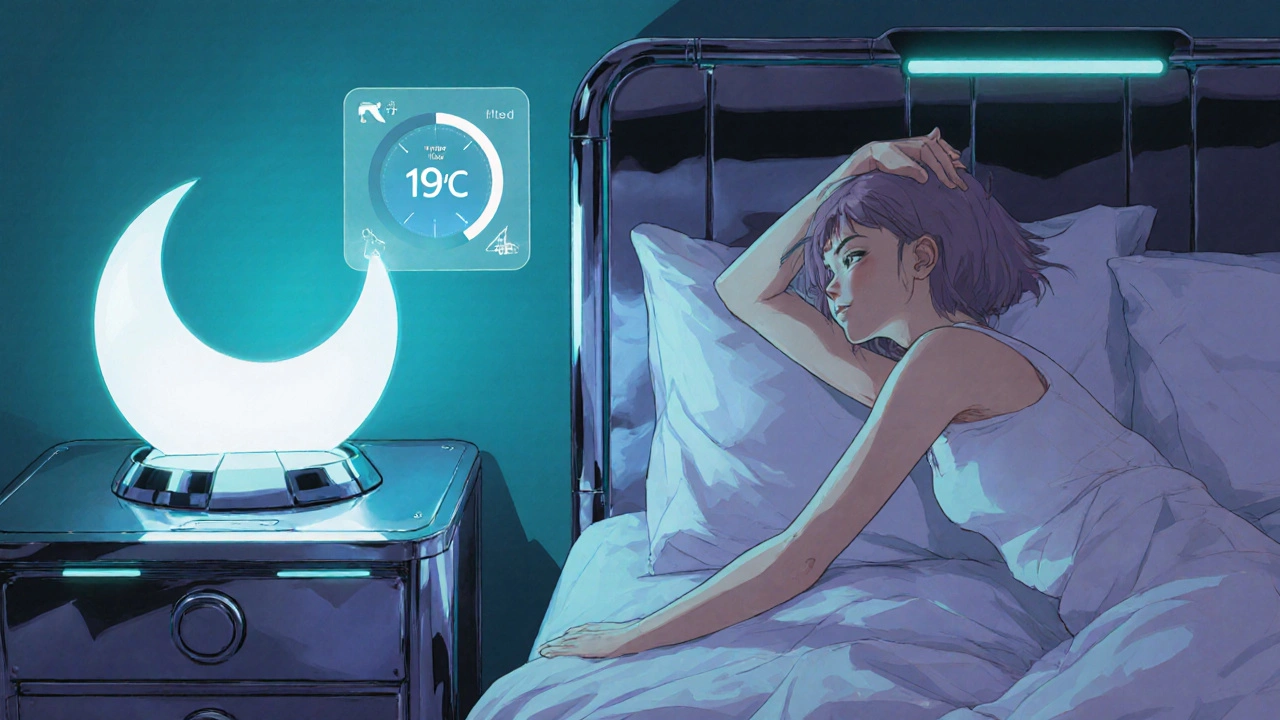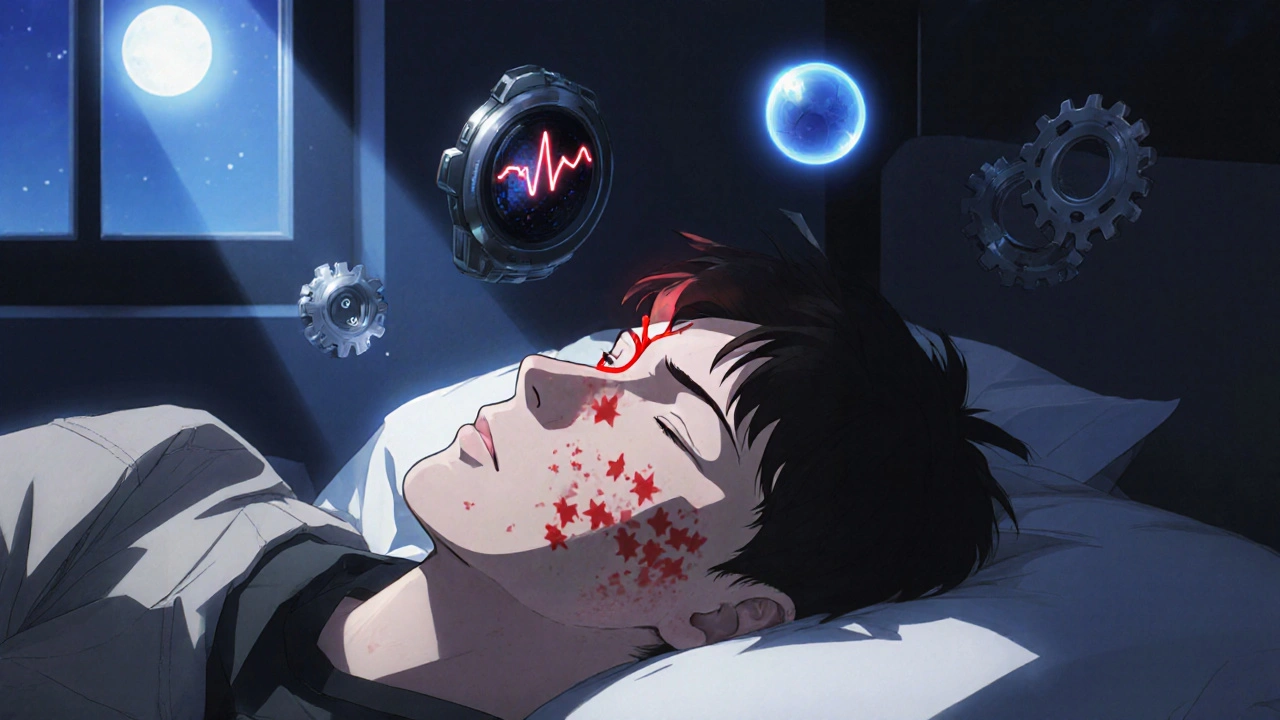Sleep-Acne Severity Estimator
This tool estimates how your average sleep hours may correlate with nodular acne severity based on scientific research. The calculator uses data from clinical studies showing the relationship between sleep duration and skin inflammation.
Ever wonder why a bad night’s sleep seems to bring out a fresh wave of breakouts? You’re not imagining it. Research shows that the amount and quality of sleep you get can directly influence the severity of nodular acne, a severe type of acne that forms deep, inflamed nodules under the skin. In this article we’ll break down the science, point out the hidden habits that sabotage your skin, and give you a step‑by‑step plan to sleep better and see clearer skin.
What Exactly Is Nodular Acne?
Unlike the small whiteheads that appear on a teenager’s forehead, nodular acne shows up as large, painful lumps that sit deep in the dermis. These nodules can take weeks to heal and often leave scars. They form when hair follicles become clogged with excess oil, dead skin cells, and bacteria, then swell and inflame. Because the blockage occurs deep beneath the surface, the body’s immune response is stronger, leading to the characteristic swelling and tenderness.
Sleep Quality: More Than Just Hours
Sleep quality isn’t just about clocking eight hours. It’s about how much of that time you spend in restorative stages-especially deep sleep (stage3) and REM sleep. During deep sleep, the body repairs tissues, including skin, and releases growth‑fixing hormones. During REM, the brain clears out toxins and balances emotional stress. If either stage is cut short, the skin’s repair crew is forced to work overtime.
Hormonal Rollercoaster: Cortisol, Melatonin, and Acne
Two hormones play a starring role in the sleep‑acne link:
- Cortisol-the stress hormone spikes when you’re sleep‑deprived. High cortisol tells the sebaceous glands to pump out more oil, creating the perfect breeding ground for acne‑causing bacteria.
- Melatonin-produced in darkness, melatonin not only regulates sleep but also has antioxidant properties that protect skin cells from damage. Low melatonin means more oxidative stress, which fuels inflammation in existing nodules.
When you miss out on sleep, cortisol rises and melatonin drops, creating a double‑hit that can aggravate nodular acne.
Inflammation and the Skin Barrier
Sleep deprivation ramps up systemic inflammation. Blood tests of chronic sleepers show higher levels of C‑reactive protein (CRP) and interleukin‑6 (IL‑6). Those same markers are found in inflamed acne lesions. Additionally, poor sleep weakens the skin’s barrier-its outermost protective layer-making it easier for irritants and bacteria to slip through.

Lifestyle Factors That Tie Sleep and Acne Together
Beyond hormones, everyday habits connect the two conditions:
- Screen time: Blue light from phones delays melatonin production, pushing bedtime later.
- Late‑night eating: Sugary or dairy‑heavy snacks spike insulin, which can increase oil production.
- Stress: Work stress or anxiety spikes cortisol, as mentioned earlier.
- Exercise timing: Intense workouts close to bedtime raise body temperature, making it harder to fall asleep.
Each of these habits, on its own, can nudge the skin toward more breakouts; together they create a perfect storm for nodular acne.
Practical Sleep‑Hygiene Steps for Clearer Skin
- Set a consistent bedtime. Aim for the same hour every night, even on weekends. Your body’s circadian rhythm appreciates routine.
- Dim the lights 60 minutes before bed. Use warm lamps or a blue‑light filter on devices to let melatonin rise naturally.
- Limit caffeine after 2p.m. Caffeine can linger in your system for up to six hours, keeping you wired.
- Create a wind‑down ritual. Options include gentle stretching, reading a paper book, or a short meditation. The goal is to signal to your brain that sleep is coming.
- Keep the bedroom cool. A temperature around 18‑20°C (65‑68°F) supports deep sleep.
- Watch your nighttime snacks. If you must eat, choose a small portion of protein and healthy fat-think a handful of almonds.
- Exercise earlier. Finish vigorous workouts at least three hours before bedtime.
Following these steps can lower cortisol, boost melatonin, and give your skin the repair time it needs.
When to Seek Professional Help
Even with the best sleep habits, nodular acne often requires medical treatment. Dermatologists may prescribe:
- Oral antibiotics to reduce bacterial load.
- Isotretinoin (Accutane) for severe cases.
- Topical retinoids to speed up cell turnover.
- Combination therapies that pair oral meds with benzoyl peroxide or clindamycin gels.
If you notice painful nodules that don’t improve after four weeks of better sleep, schedule a visit. Early intervention can prevent scarring.

Quick Checklist: Sleep + Skin Health
- Sleep 7-9hours/night.
- Lights off, blue light filtered, 1hour before bed.
- Caffeine no later than 2p.m.
- Room temp 18‑20°C.
- Wind‑down ritual (stretch, read, meditate).
- Avoid heavy meals after 8p.m.
- Exercise at least 3hours before sleep.
Tick these boxes daily and watch your skin respond.
How Sleep Duration Relates to Acne Severity
| Sleep Hours/night | Typical Acne Rating (0‑5) | Notes |
|---|---|---|
| Less than 5 | 4‑5 (severe, often nodular) | High cortisol, low melatonin, frequent inflammation. |
| 5‑6 | 3‑4 (moderate‑severe) | Occasional flare‑ups, slower skin repair. |
| 7‑8 | 1‑2 (mild‑moderate) | Balanced hormones, better barrier function. |
| 8‑9 | 0‑1 (minimal) | Optimal repair, low inflammation. |
| More than 9 | 0‑1 (minimal) | Too much sleep rarely harms skin; quality matters most. |
Frequently Asked Questions
Can a single night of poor sleep cause a nodular breakout?
One bad night can increase cortisol enough to boost oil production, but a full nodule usually needs a few nights of stress combined with existing clogged pores. So, you might notice a flare‑up, but the deep bump often takes longer to develop.
Is it better to nap if I can’t get a full night’s sleep?
Short naps (20‑30 minutes) can restore alertness without disrupting REM cycles. Longer naps close to bedtime may push your sleep schedule later, which could hurt melatonin production and aggravate acne.
Do sleep‑aid supplements help skin?
Melatonin supplements can improve sleep onset for some people, and the antioxidant effect may benefit skin. However, dosage matters; too much melatonin can cause grogginess. Always talk to a healthcare provider before starting.
How long does it take to see skin improvement after fixing my sleep?
Skin turnover takes about 28‑30 days, so you’ll typically notice less redness and fewer new lesions after a month of consistent, quality sleep. Existing nodules may still need professional treatment.
Should I avoid all caffeine to improve acne?
Caffeine isn’t directly acne‑causing, but it can interfere with sleep if consumed late in the day. Limiting it after early afternoon is a safe bet for both better rest and clearer skin.





Mary Davies
October 17, 2025 AT 15:09I’ve always felt that those sleepless nights leave a fog on my face, and then the next morning the nodules seem to scream louder. It’s not just the oil – the spike in cortisol throws the whole sebaceous system into overdrive, and the skin barrier barely recovers before the next stress hit. When melatonin drops, the antioxidant shield fades, letting inflammation linger like a bad drama. So, getting that deep REM feels like giving your skin a backstage pass to repair.
Valerie Vanderghote
October 24, 2025 AT 10:21When I first read about the hormone tango between cortisol and melatonin, I could almost hear a symphony of chaos playing across my forehead.
The idea that a single night of tossing and turning can tip the scales of oil production feels like a plot twist in a soap opera that never ends.
Your body, after all, is a delicate orchestra; each hormone is a musician that must play in time, and sleep is the conductor that keeps the tempo steady.
In the absence of that conductor, cortisol bursts onto the stage like an angry soloist, shouting “Produce more sebum!” while melatonin slinks offstage, leaving the skin exposed to free radicals.
The result, as you described, is that the pores become clogged, the bacteria get a banquet, and the immune system rolls out an angry brigade of cytokines that inflame the deep follicles.
Researchers have even measured C‑reactive protein soaring after just a few nights of fragmented sleep, which mirrors the blood work we see in severe acne patients.
Moreover, the skin barrier, that thin yet mighty wall of lipids, begins to crack when it doesn’t get its nightly renovation, letting irritants slip through like uninvited guests at a midnight party.
What’s more, the habit of scrolling under blue light is a sneaky thief that steals melatonin before the darkness even arrives, extending the hormone imbalance well into the early hours.
Add a late‑night sugar rush, and insulin spikes join the chorus, prompting the sebaceous glands to crank up oil output as if they were trying to lubricate a rusted engine.
Even the temperature of your bedroom can be a silent accomplice; a warm room reduces the depth of slow‑wave sleep, the very phase where tissue repair and collagen synthesis are at their peak.
All of these factors combine into a perfect storm, a perfect storm that doesn’t just knock on the door of surface blemishes but storms right into the deep caverns where nodular acne makes its home.
The good news, however, is that each element can be tamed with simple, consistent habits, like dimming lights an hour before bed, swapping late‑night chips for a handful of almonds, and setting a cool thermostat.
Your checklist reads like a battle plan, and following it is akin to assembling a rescue team that shows up nightly to clean up the mess.
Even if you are already on prescription medication, improving sleep quality can amplify the therapeutic effects, making the skin’s healing process faster and less scar‑prone.
In practice, I started a ritual of gentle stretching and a short meditation session, and within three weeks my breakouts thinned and the lingering redness dulled.
So, think of sleep not just as a nightly rest but as the ultimate skin‑care routine that works from the inside out, and you’ll see the nodules retreat like actors taking their final bow.
Michael Dalrymple
October 31, 2025 AT 04:33Understanding the interplay between cortisol and melatonin is akin to contemplating the balance of mind and body; when we honor that balance, the skin often follows suit. A consistent bedtime acts as a gentle reminder to the endocrine system that restoration is paramount. By reducing stress before sleep-perhaps through a brief journal entry or a calming breathing exercise-we can lower cortisol spikes that otherwise feed the pores. The result is a calmer complexion and, over weeks, a noticeable reduction in deep nodules. Remember, persistence is the philosopher’s path to clear skin.
Emily (Emma) Majerus
November 6, 2025 AT 23:45Sleep better, skin clear, simple as that.
Virginia Dominguez Gonzales
November 13, 2025 AT 18:57When the night finally slips into a velvety hush, imagine each breath as a brushstroke that smooths the canvas of your face. The drama of hormonal surges fades, leaving the skin’s natural heroes-its repair cells-free to work their magic. By dimming the lights and turning off the phone, you give melatonin the stage it deserves, and the nodules lose their spotlight. Keep that nightly ritual, and the mirror will applaud you with a clearer glow.
Alexis Howard
November 20, 2025 AT 14:09People love to claim sleep is the holy grail for acne but the science isn’t that simple. You can get decent skin with proper diet and topical treatments even if you pull a few all‑nighters. Stress hormones aren’t the only villains, genetics play a huge role. So don’t obsess over every hour of REM, just focus on overall health.
Darryl Gates
November 27, 2025 AT 09:21From a dermatological standpoint, the evidence linking deep sleep to reduced inflammatory markers is robust. Studies show that stage‑3 sleep enhances collagen synthesis, which reinforces the dermal matrix and mitigates nodule depth. Additionally, melatonin’s antioxidant capacity directly neutralizes free radicals that would otherwise exacerbate inflammation. Maintaining a cool bedroom environment (around 19 °C) optimizes slow‑wave sleep, thereby supporting skin repair. Combining these sleep‑hygiene practices with a dermatologist‑prescribed regimen yields the best outcomes.
Kevin Adams
December 4, 2025 AT 04:33Ah, the midnight hour-when the world holds its breath and the skin, like a nocturnal poet, writes its verses in pores. If we ignore the subtle whisper of melatonin, we are essentially silencing the muse of renewal. The cortisol surge is the tyrant that demands tribute in the form of excess oil, and the nodules are but rebels rising against that oppression. Yet, every rebel can be quelled by the gentle hand of restorative sleep, the true philosopher‑king of our biology. Embrace the darkness, cherish the cool silence, and watch the acne narrative transform from tragedy to triumph. In this nightly alchemy, the body discovers its own salvation, and the skin glows like a stained‑glass window illuminated by inner peace. Let us therefore honor sleep as the sacred covenant between mind and flesh, for in that covenant lies the secret to unblemished dawns.
Katie Henry
December 10, 2025 AT 23:45Your insight provides an excellent foundation, and I encourage every reader to commit to those actionable steps with vigor. Establishing a bedtime routine is not merely a suggestion but a call to disciplined excellence. By treating sleep as a performance‑enhancing practice, you empower your skin to recover with the precision of a well‑orchestrated symphony. Let this momentum carry you forward, and the results will speak for themselves.
Nickolas Mark Ewald
December 17, 2025 AT 18:57Improving sleep quality is a practical way to support overall skin health. Consistent rest can reduce inflammation and help acne heal faster.
Chris Beck
December 24, 2025 AT 14:09The British healthcare system has long recognized the link between circadian rhythm and dermatological outcomes, yet many Americans ignore this critical data. While publicity hammers on quick fixes, the real issue is a cultural sleep deficit that fuels widespread skin inflammation. If we adopted stricter sleep standards, we would see a dramatic drop in severe acne cases across the nation. It’s time to stop the nonsense and embrace evidence‑based sleep hygiene.
Winston Bar
December 31, 2025 AT 09:21Honestly, blaming sleep habits for every breakout is a bit of an over‑simplification. You can have excellent sleep and still suffer from hormonal acne due to genetics or diet. While sleep matters, it’s not the sole villain in the acne saga. People need a balanced view, not a one‑size‑fits‑all rant.
Russell Abelido
January 7, 2026 AT 04:33Reading through all these tips feels like a warm blanket on a restless night, and I can totally relate to the frustration of waking up to fresh nodules 😅. The way you break down the science makes it less intimidating, and the practical steps feel doable even on busy weeks. Keep sharing these insights; they’re a beacon for anyone battling late‑night breakouts.
Patricia Echegaray
January 13, 2026 AT 23:45What if the “sleep industry” isn’t just selling mattresses but also covertly pushing products that disrupt melatonin production? Some corporate labs have been rumored to embed blue‑light emitting compounds into everyday devices, subtly sabotaging our natural rhythms. The real agenda might be to keep us dependent on expensive skin‑care regimes while we remain half‑asleep. It’s a tangled web, and the more we uncover, the clearer the picture becomes-like peeling back layers of a conspiracy that’s been hidden in plain sight.
Miriam Rahel
January 20, 2026 AT 18:57The article accurately summarizes the current consensus, though it could have cited more primary studies for robustness. Overall, the recommendations are sound, but the emphasis on bedtime consistency feels somewhat overstated. Nonetheless, it serves as a useful primer for those seeking to align sleep and dermatology.